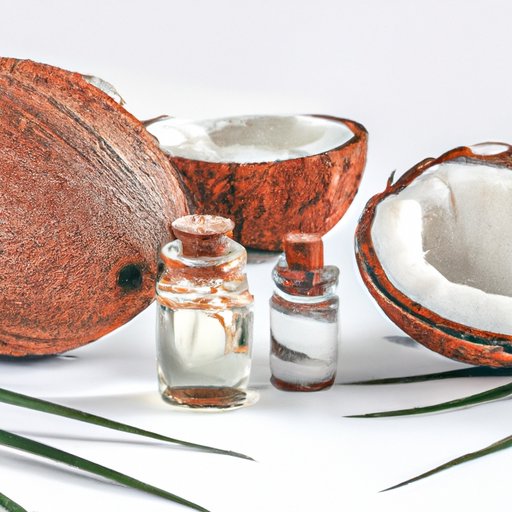
Can You Put Coconut Oil on Your Face?
Coconut oil has been gaining immense popularity in the beauty industry in recent years due to its numerous skincare benefits. However, there is always a dilemma about whether it’s a good idea to use coconut oil on the face. Will it cause acne breakouts? Is it too oily? Let’s clear up the confusion and take a closer look at using coconut oil on your face.
Benefits of Using Coconut Oil on Your Face: A Comprehensive Guide
When it comes to skincare benefits, coconut oil has a lot to offer. Firstly, coconut oil is an excellent moisturizer for the skin. It’s composed of natural fatty acids that help nourish and hydrate the skin. Secondly, it has anti-aging properties that help in reducing wrinkles and fine lines. Lastly, it has anti-inflammatory and antibacterial properties that help soothe irritated skin and reduce redness.
A scientific study conducted in 2017 showed that virgin coconut oil has significant moisturizing effects on the skin. The study found that coconut oil was as effective as mineral oil in treating mild to moderate Xerosis or dry skin.
Say Goodbye to Harsh Chemicals: Why Coconut Oil is the Perfect All-Natural Facial Moisturizer
Coconut oil is a perfect natural replacement for traditional facial moisturizers that contain chemicals. It is a safe and natural alternative that works well for all skin types. It’s especially good for people with sensitive skin as it’s gentle and nourishing.
There are different ways to incorporate coconut oil into your daily skincare routine. Daily use of a small amount of coconut oil can prevent wrinkles, tighten sagging skin, and protect against sun damage. You can use coconut oil as a face wash, make-up remover, or even as a leave-in overnight mask.
The Dos and Don’ts of Using Coconut Oil on Your Face: A Step-by-Step Guide
Although coconut oil has numerous benefits, it’s essential to use it in the right way to avoid any negative effects. Proper application of coconut oil on the face can help you get the desired results.
The first step is to choose an organic, cold-pressed, and extra virgin coconut oil that’s free from additives and fillers. Secondly, it’s crucial to cleanse your face thoroughly before application. Then, apply a small amount of coconut oil to your face and neck and massage it gently in a circular motion. Don’t leave the coconut oil on your face for too long as it may clog pores. Rinse your face thoroughly with warm water before wiping it off with a clean towel.
It’s important to avoid using coconut oil on the face if you have oily skin. Coconut oil can clog pores and cause acne breakouts. Also, avoid applying too much coconut oil as this may cause the skin to feel greasy.
Clearing Up the Confusion: Debunking Common Myths About Using Coconut Oil on Your Face
There are many misconceptions about using coconut oil on the face. One of the most common myths is that coconut oil clogs pores and causes acne. However, this isn’t entirely true. Virgin coconut oil is non-comedogenic, meaning it doesn’t clog pores. According to one study, coconut oil has antibacterial properties and can help control acne breakouts by decreasing the number of acne-causing bacteria on the skin.
Another common myth is that coconut oil causes wrinkles. This is also not true. Coconut oil is rich in antioxidants that help protect the skin from free radicals and reduce wrinkles and fine lines.
From Acne to Aging: How Coconut Oil Can Benefit Your Skin at Any Age
Coconut oil can benefit different skin types and ages. For acne-prone skin, coconut oil has antimicrobial properties that help reduce the bacteria that cause breakouts. For mature skin, coconut oil can help reduce wrinkles and improve skin elasticity due to its antioxidant properties.
To address specific skin concerns, you can use coconut oil in different ways. For example, those with dry skin can use coconut oil as a leave-in mask overnight. Those with oily skin can use a small amount of coconut oil to moisturize. Mixing coconut oil with other ingredients like turmeric and honey can also provide additional skin benefits.
Coconut Oil vs. Other Facial Oils: Which is Right for Your Skin Type?
While coconut oil is a great natural ingredient to use on the face, it’s not suitable for everyone. There are different oils that you can use on your face depending on your skin type and concerns.
For dry skin, argan oil is a good option as it absorbs quickly and is rich in fatty acids that help nourish and moisturize the skin. For acne-prone skin, tea tree oil is a good option as it has natural antibacterial and anti-inflammatory properties. For sensitive skin, jojoba oil is a good option as it’s gentle and non-comedogenic.
The Pros and Cons of Using Coconut Oil on Your Face: What You Need to Know Before Using it on Your Skin
Before you start using coconut oil on your face, it’s important to weigh the pros and cons. One of the main benefits of using coconut oil on the face is that it’s a natural and safe ingredient. On the downside, coconut oil may cause allergic reactions in some people. It’s essential to conduct a patch test before using coconut oil on your face to avoid any adverse effects.
If you have oily or acne-prone skin, it’s recommended to avoid using coconut oil as it may exacerbate these conditions. Those with dry or sensitive skin can benefit from using coconut oil in moderation.
Conclusion
Using coconut oil on your face has many benefits for your skin. It’s a natural, safe, and nourishing ingredient that can help you achieve healthy and glowing skin. However, it’s important to use it in the right way and avoid any negative effects. Incorporating coconut oil into your daily skincare routine can enhance your skin’s health and appearance.





